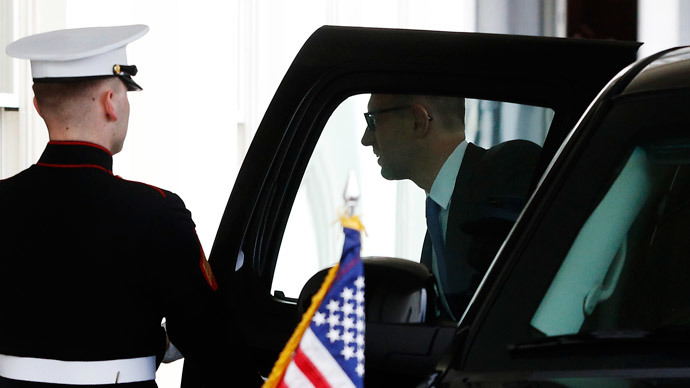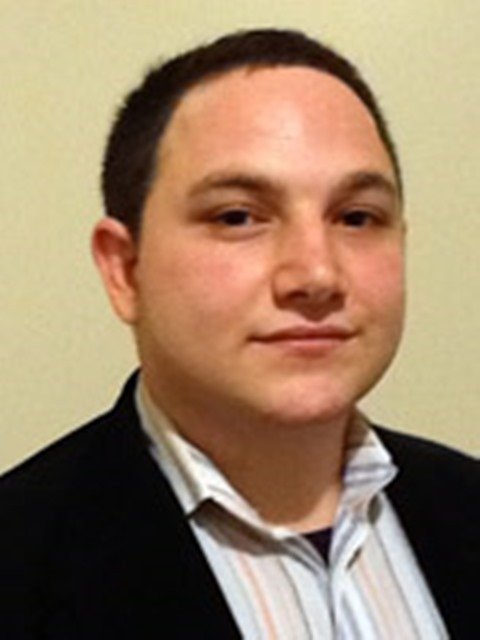'Yatsenyuk is face of illegal seizure of power'

Coup-installed Ukrainian PM Arseny Yatsenyuk is being used by US to legitimize austerity and economic warfare against the people of Ukraine and to whitewash the illegal seizure of power, independent geopolitical analyst Eric Draitser told RT.
RT: President Obama has said that the people of Ukraine have the right to choose their direction for the future. Do you think he also meant those in the south and east of the country who actually disagree with Kiev's policies?
Eric Draitser: This is all part of the US attempt to whitewash what happened and the forces that brought Yatsenyuk and the other coup leaders into power. Moreover, it is an attempt to legitimize what the US is doing US policy in terms of recognizing what is an undoubtedly an illegal government. And of course it is interesting that Yatsenyuk comes to Washington as the voice of Ukraine as the voice of the people of Ukraine and most importantly as the legitimate voice of the people of Ukraine, considering its completely out of keeping with not only international law but with events on the ground.
We of course know that Yatsenyuk was brought to power by a particular forces in the West such as we saw with the Victoria Nuland phone calls and other elements that we have seen brought into power on a wave of an illegal putsch. And now coming to Washington Obama and his advisers are trying to legitimize that putsch and trying to whitewash the fact that it is clearly illegal. Of course Putin and the Russian government are not accepting this, and this is really the heart of the matter.
RT:Obama praised Yatsenyuk for upholding the best possible non-violence over the recent months. Do you think that indeed adds up to how the events were unwinding on Maidan?
ED: Certainly not, what Obama means when he says the people of Ukraine, it is euphemisms for US foreign policy. US foreign policy dictates whatever the people of Ukraine or any other country might believe. This is what we have seen with the so-called, the people of Libya, the people of Syria, the people of Yemen, the people of Pakistan and we can go on and on and on.
Every time the US government refers to the people what they really mean is their people, their chosen interest, their political puppet and so forth and Yatsenyuk is really a representative of that. When he talks about the people, I wonder if he is also referring to the Nazis that have also seized power, the Right, Yarosh, Paruby and all those individuals who have seized power by force illegally are they part of the so-called people? This would be the question, if I had the opportunity, I would ask President Obama.

RT:Speaking at the Atlantic Council, Yatsenyuk mentioned the economic and military challenges Ukraine faces. We have heard a lot about the financial aid agreements so far. But what military help can he expect?
ED: In terms of the military help, this is probably out of the question. For one there is no treaty under which Western powers could actually provide military assistance to Ukraine. Although NATO has tried to expand its influence and hegemony into Ukraine, Ukraine is not a NATO partner. It is not officially part of NATO therefore there is no relevant treaty under which they could be protected militarily. And I think that it is very important to note that the military of Ukraine itself is not necessarily behind Yatsenyuk and the putsch government in Kiev.
We saw recently an attempt to mobilize the military and only a tiny fraction of the military actually showed up for duty in loyalty of the so-called government in Kiev. We have seen high level defection with the leadership of military bureaucracy. We have seen countless individuals, high ranking individuals who have sworn loyalty either to Crimea or their respective regions or either refused to swear loyalty to Kiev.
So the question, when Yatsenyuk talks about military resistance, resisting the so-called Russian aggression, [is] who exactly is he referring to? And quite frankly I would also add what Russian aggression is he referring to? Because what we last week, Yatsenyuk making the outlandish claim regarding tanks on the streets, tanks which do not exist, for which there is no evidence showing outside the treaty, the Sevastopol base. So again, when we talk about Yatsenyuk and his statements, what we are really talking about are the statements of the US and the State Department, those who brought Yatsenyuk into power.
RT:Yatsenyuk has said that he stands for a peaceful solution of the Crimean situation, but also added that he will not surrender. How would you break that down?
ED: It is still difficult to say because it looks like the Crimean government which has already mover toward de facto independence from Ukraine and possibly moving towards, certainly closer to the Russian Federation. It remains to see what course this is going to be taken because of course the US and the NATO powers already established the historical precedent, not only with Kosovo but also with South Sudan and in number of instances, where the US, when it serves their agenda supports self-determination and is not particularly interested in the sovereignty of nations that oppose its policies.
However in the case of Crimea, of course, Washington has already dismissed out of hand the notion that Crimea has the right for self-determination, that Crimea has the right for independence. So it correct to say that there is certainly a certain conflict, not only with the international also but also with the precedent that has been established by the US and the Western powers.

And of course it is utter hypocrisy for Obama and Washington to deny the right of the Crimean people to determine their future while having vociferously argued to favor the right of Kosovo’s Albanians to determine their future, of the people of South Sudan to determine their future. Again this comes back to the question, is the US truly interested in democracy or does the US only use democracy as convenient pretext further their geopolitical agenda. Certainly, I would argue the latter.
RT:Yatsenyuk has said that he stands for a peaceful solution of the Crimean situation, but also added that he will not surrender. How would you break that down?
ED: It is unclear what Yatsenyuk means when he talks about nor surrendering. For one, it is unclear because who exactly Yatsenyuk is in charge of. We know that the Nazi elements from the Right Sector and from Svoboda and others have occupied key positions in security forces. If he is referring to them then certainly there’s some validity that they won’t be surrendering. But to what extent does Yatsenyuk have the support in Ukraine? This remains certainly an open question.
So when he talks about not surrendering then what he means is that he will not surrender the legitimacy that has been conferred upon him by external forces by the US and the NATO powers. Of course, Yatsenyuk is not the legitimate leader in the eyes of the international law. Yatsenyuk is certainly not legitimate in the eyes of the eyes of the Russian government. So it is this question of legitimacy which is built in to this notion of not surrendering. Who exactly does Yatsenyuk command the authority over?
RT:Obama also thanked Yatsenyuk for the great work he has done so far. What accomplishments is he referring to exactly?
ED: Yatsenyuk accomplishments are many. Yatsenyuk is the face of the illegal seizure of power. That is to say he is a Western, liberal-minded face that is an attempt to sell the illegal seizure of power to the Western news consumer and to the Western public more broadly. In terms of his accomplishments, number one would be, occupying the PM position, but also the accomplishment of being able to sell them the austerity to the people of Ukraine, to sell them the notion that the IMF is going to rescue them, that the Western powers, that the EU and the US are somehow going to preserve and protect an economic future Ukraine.
This is absolutely key because the Association Agreement which was rejected by Yanukovich, which has precipitated this crisis – this was part of the economic future in tandem with a Russian proposal to also provide them with economic assistance. Now when Yatsenyuk gets up and says that the West is going to provide economic security for Ukraine, it is unclear exactly what he means because all we have heard from the west so far is this notion of loan guarantees, not money, not hard money to be used to pay down the debt, to be used to fund the government but loan guarantees.
And as we all know, these loan guarantees come with very excruciatingly painful conditionalities. Conditionality of austerity, the driving down of wages, the slashing of social benefits, the attacks on pensioners. All of this, which is already began in earnest under Yatsenyuk, who just a few days ago announced that the pensioners are going to have their pensions slashed by up to 50 percent. Yatsenyuk major accomplishment is being able to legitimize austerity and economic warfare against the people of Ukraine within the maelstrom within this illegal seizure of power.
The statements, views and opinions expressed in this column are solely those of the author and do not necessarily represent those of RT.
The statements, views and opinions expressed in this column are solely those of the author and do not necessarily represent those of RT.













